Your itinerary:
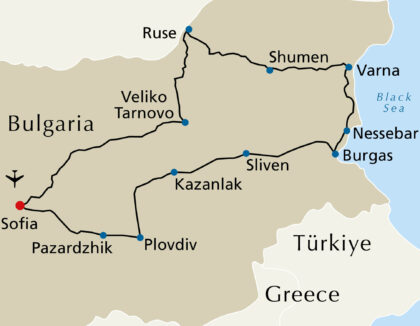
Based on our own experience and the many tips we have received from enthusiastic holidaymakers, we have compiled the most famous highlights and World Heritage Sites of Bulgaria for you!

Based on our own experience and the many tips we have received from enthusiastic holidaymakers, we have compiled the most famous highlights and World Heritage Sites of Bulgaria for you!
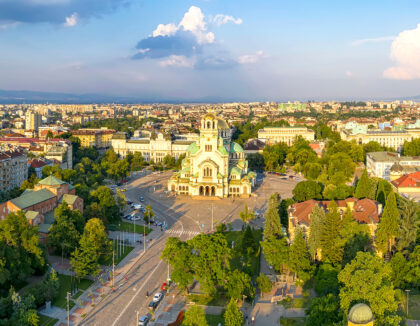
A brief and comfortable flight takes us to the enchanting capital. Our friendly and competent, English-speaking cultural tour guide welcomes us at the airport and accompanies us to our modern coach. We travel to our lovely 4-star hotel in the Sofia area.
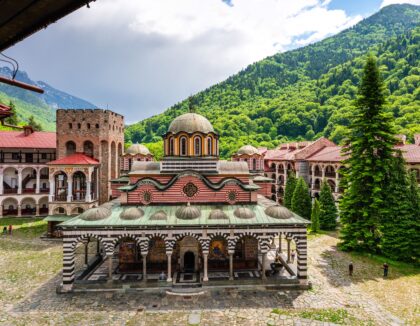
In the morning, the picturesque city gem Sofia awaits to be discovered. World-famous attractions include the Alexander Nevsky Cathedral, the St. George Rotunda, the ruins of the Roman city of Serdika, and the Church of St. Sophia. Following this, we will travel to the renowned Rila Monastery. At an altitude of 3,763 ft, we will visit this special UNESCO World Heritage Site. The Orthodox monastery was founded in the 10th century by Saint Ivan of Rila. It houses a museum, in which impressive collections of books, manuscripts and wood carvings are displayed. We will be staying in a 4-star hotel in Plovdiv, one of the oldest inhabited cities in Europe.
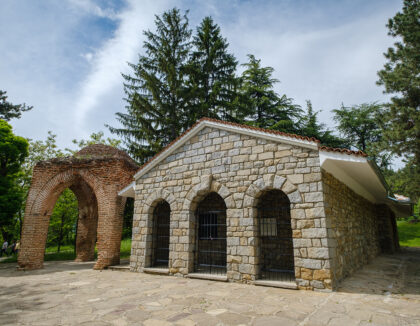
Firstly, we are looking forward to Plovdiv, the Cultural Capital of Europe in 2019. It is famous for its unique historical sites such as the ancient Roman theatre and the Roman stadium. Later we will continue to Kazanlak, where we will visit the fascinating Thracian tomb. This UNESCO World Heritage Site is known for its particularly vibrant wall paintings. The dome tomb with brick vault dates back to the 4ᵗʰ century BC. Subsequently, we will travel to Sliven, where we will check into our next star-rated accommodation.
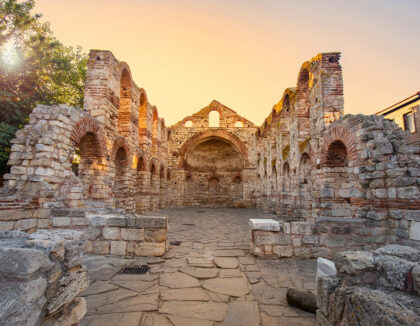
After breakfast, we head to Nessebar and embark on a tour of the dreamy old town. The city was founded 3,200 years ago on a picturesque peninsula and has experienced Greek, Roman and Turkish rule throughout its rich history. Due to its extraordinary cultural wealth, the old town has been declared a UNESCO World Heritage Site. We also have time for our own explorations. Afterwards, we proceed to Varna, the ‘Maritime Capital of Bulgaria’. The third largest city in the country was under the influence of both the Macedonian Empire of Alexander the Great and the Roman Empire. The city‘s attractions include the imposing cathedral, the necropolis, and the archaeological museum, which houses the world-famous Acropolis of Varna. We take a stroll through the Sea Garden before checking into our charming 4-star hotel.
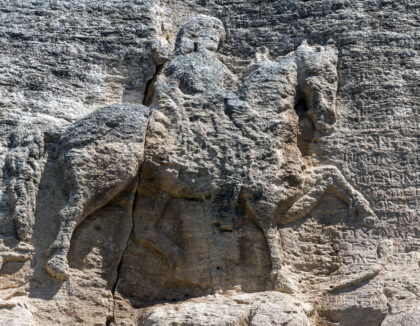
Today‘s journey first takes us to Madara. Here is the unique rock relief of the Madara Rider. This UNESCO World Heritage Site is a central monument of the First Bulgarian Empire. The rider, carved out of the steep cliff face at a height of 25 yd, was once visible from afar. The relief depicts the rider with a lion at his feet that he has just killed. He is accompanied by a dog. Based on the inscriptions, scientists estimate its creation to a period between the years 705 and 831. Thus, the rider would be the oldest surviving document from medieval Bulgaria. Subsequently, we continue our journey to the Thracian tomb of Sveshtari. This was also included in the UNESCO World Heritage Site due to its impressive architecture and artistic decoration. Unique are the half-human, half-plant sculptures that adorn the tomb. After this experience, we continue our journey to Ruse and check into our modern star hotel.
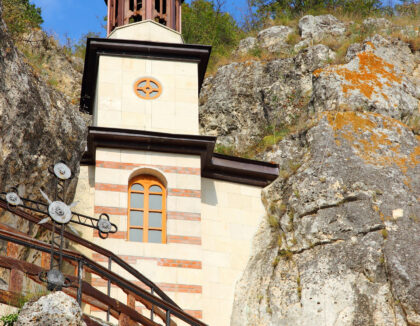
Today we are travelling to Veliko Tarnovo. Our route takes us past another UNESCO World Heritage Site, the Rock Churches of Ivanovo. From the late 12ᵗʰ century, individual hermits inhabited the natural caves of the mountains and dug chambers into the soft limestone. Over time, these individual chambers were connected and thus formed the monastery. Frescoes from the 13ᵗʰ and 14ᵗʰ centuries are still preserved in six of the churches and chapels of the complex. We also enjoy a breathtaking panorama before we continue our journey to Veliko Tarnovo. The former capital became one of the most significant cultural, political and economic centres in all of Southern Europe under the rule of the Tsar. Here you can explore the enchanting old town, which is a protected monument, or visit the Tsarevets Fortress, where a Tsar‘s palace once stood. Also worth a visit is the Crafts Street ‘Samovodska Charshia’, where traditional medieval crafts are showcased. We will be staying overnight in a 4-star hotel in Veliko Tarnovo.
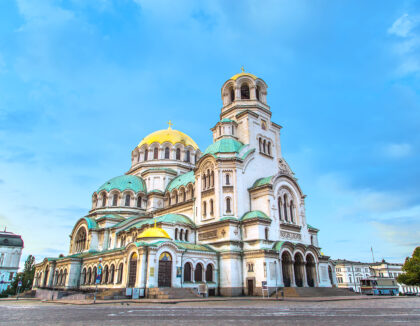
Today we set off for Arbanassi, an idyllic village that was founded in the 15ᵗʰ century by Bulgarian, Greek and Albanian Christians. The highlight of the place is the Church of the ‘Nativity of Christ’ from the 17ᵗʰ century. It is known for its impressive wall paintings. The breathtaking view of a dreamlike landscape additionally delights us. Afterwards, we visit the beautiful Trojan Monastery, whose spiritual significance captivates us. Then we return to the capital Sofia. Upon arrival, we visit the Bojana Church, also a UNESCO World Heritage Site, and admire the impressive frescoes. Of course, we also have some free time, which we spend in this dream city. The last night of our tour is spent in our lovely 4-star hotel in Sofia.
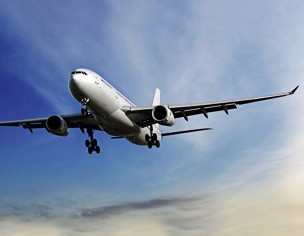
Today, it is time to say goodbye. A fantastic and eventful week comes to an end. Our coach takes us to the airport, where we embark on our return flight to the UK, filled with many beautiful memories.
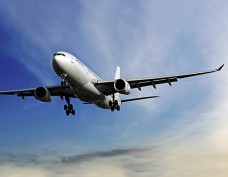
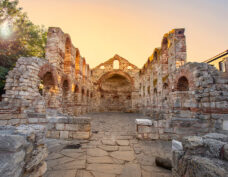
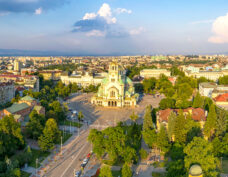
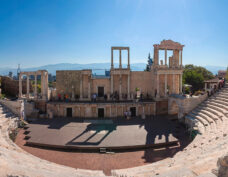
Explorer Package: The package includes guided city tours in Sofia, Plovdiv, Varna and Veliko Tarnovo, as well as admission to the ancient theatre of Plovdiv, the archaeological museum, the necropolis & the cathedral in Varna, the Tsarevets fortress, and the church of the ‘Nativity of Christ’: only £139 per person.
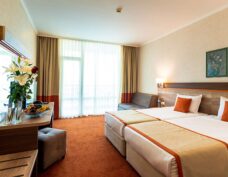
Single room surcharge: only £269 per person (subject to availability)
Example hotels
| Jan | Feb | Mar | Apr | May | Jun | Jul | Aug | Sep | Oct | Nov | Dec | |
|---|---|---|---|---|---|---|---|---|---|---|---|---|
| Sofia | 2 | 4 | 9 | 16 | 20 | 24 | 25 | 26 | 23 | 15 | 9 | 3 |
| London | 6 | 8 | 9 | 11 | 15 | 20 | 21 | 20 | 19 | 15 | 10 | 7 |
Below is an information overview. The conditions of entry, as well as the political and health situation, can change anywhere in the world at any time. We therefore recommend checking before your trip. Please check the website of the Foreign Office (www.gov.uk) before your departure.
Bulgaria is located in the east of the Balkan Peninsula
parliamentary republic
Sofia (about 2.4 million inhabitants)
predominantly Christians
Bulgarian
Continental climate in the north of the country, alpine climate in the west and the mountain ranges, and in the southeast it transitions into a Mediterranean climate.
In Bulgaria, Eastern European Time UTC+3 is observed with daylight saving time changes. The time difference to the UK is +2 hours all year round.
230 Volt Alternating Current, 50 Hertz. An adapter is required.
The dialling code for long-distance calls from the UK to Bulgaria is 00359 (+359). For calls to the UK, one dials 0044 (+44) first. The 0 before the area code is omitted each time.
Art has a long tradition in the region of Bulgaria. Numerous Thracian burial mounds and goldsmith works have been preserved from the 2ⁿᵈ millennium BC. Bulgaria boasts a rich tradition in choral singing. The state choir has achieved great success through its unique style and is internationally renowned today. The Bulgarian national instrument is, alongside the three-part longitudinal flute Kaval, the bagpipe Gaida.
If you are planning to travel to an EU country you must meet the Schengen area rules. Your passport must meet 2 requirements. It must be:
• less than 10 years old on the day you enter (check the ‘date of issue’)
• valid for at least 3 months after the day you plan to leave (check the ‘expiry date’)
You can travel to countries in the Schengen area for up to 90 days in any 180-day period without a visa. Check your passport is stamped if you enter or exit the Schengen area through Buglaria as a visitor. Border guards will use passport stamps to check you are complying with the 90-day visa-free limit for short stays in the Schengen area. If relevant entry or exit stamps are not in your passport, border guards will presume that you have overstayed your visa-free limit.
Nationals of other countries are advised to enquire at the Bulgarian Embassy about the entry requirements applicable to them. Whilst we endeavour to provide guidance where necessary, we can not be responsible for any problems encountered (whether at any point of entry or elsewhere) in the event that passport and visa requirements are not satisfied. For more information, please visit https://www.gov.uk/foreign-travel-advice/.
From November 2024, the new EU Entry/Exit System (EES) will start for all non-EU nationals, including British nationals, travelling in or out of the Schengen area. The Schengen area is made up of 29 European countries, 25 of which are EU Member States. The EES is a digital border system which registers non-EU visitors travelling into the Schengen area instead of stamping their passports. You will need to have your fingerprints and your photo taken when entering the Schengen area. You may experience longer queues at borders when the new system starts (https://travel-europe.europa.eu/ees_en). Next to this the EU will implement a new visa waiver system in 2025, called ETIAS, which will be valid for three years. British passport holders travelling to the EU will need to apply and pay for an ETIAS, via an online system (https://etias.com/).
Your tour guides will be able to provide you with detailed information on the country, people, history, culture etc., and offer advice and assistance in organising your trip. They can also help with room allocation and look forward to welcoming you with initial information. Here you will find out all you need to know and useful information about the trip.
We have put together a varied programme including numerous highlights, enabling you to experience the culture and diversity of landscape that Bulgaria has to offer, and learn all about the country and its people.
Although your trip already includes a comprehensive package, you also have the option of choosing added extras. We recommend booking the following packages:
Half board: The package includes 7× evening 3-course menu in the hotel or local restaurant: only £199 per person.
Explorer Package: The package includes guided city tours in Sofia, Plovdiv, Varna, and Veliko Tarnovo, as well as admission to the ancient theatre of Plovdiv, the archaeological museum, the necropolis & the cathedral in Varna, the Tsarevets fortress, and the ‘Nativity of Christ’ church: only £139* per person.
* Package prices may vary when booking on site.
The unit of currency is the Lev (BGN). 1 BGN = 100 Stotinki. Exchange rate (as of September 2024): 1 GBP = 2.31 BGN; 1 BGN = 0.43 GBP.
In tourist areas as well as in major cities, there are ample cash machines where money can be withdrawn in local currency using a debit card or credit card. The daily withdrawal limit of Bulgarian cash machines is 400 BGN (approx. 170 GBP). Most home banks charge a foreign transaction fee per withdrawal. Please inform yourself before your trip.
The import and export of sums from 10,000 EUR (approx. £8,500) must be declared in writing to the Bulgarian customs authorities. For coins of archaeological, historical or numismatic value and objects under monument protection, an export certificate from the Ministry of Culture must be presented. The customs regulations for German nationals can change at short notice. Therefore, please inquire in advance with the representations of your destination country.
Important: If you are travelling to Great Britain from outside the UK, your personal allowances mean you can bring in a certain amount of goods without paying tax or duty. If you go over your allowances you must declare all your goods and pay tax and duty on all the goods in that category. Please inform yourself about the current customs regulations: www.gov.uk/bringinggoods-intouk- personal-use/arriving-in-Great-Britain.
Due to its location in a seismically active zone, earthquakes can occur. Petty crime such as pickpocketing is particularly prevalent in busy areas such as airports and train stations, as well as in places heavily frequented by tourists. Good preparation and sensible behaviour can significantly reduce the likelihood of becoming a victim of crime. The following precautions are recommended:
• Always carry a mobile phone.
• Do not flaunt your valuables; if possible, avoid large, valuable handbags.
• Prefer cashless payments and only carry the cash needed for the day and no unnecessary valuables.
• When visiting publicly accessible parks and well-known attractions, avoid secluded hiking trails and deserted areas. To reduce the risk of attacks, trips should only be undertaken in groups.
In the event of non-compliance with declaration obligations, the entire imported or exported amount will be confiscated without compensation for the benefit of the Bulgarian state. In addition, fines may be imposed. Against foreigners who are accused of a criminal act in Bulgaria, the Bulgarian authorities can impose a travel ban, which is usually maintained for the entire duration of the investigation.
At least 8 weeks before your trip, check the latest country-specific health advice from the National Travel Health Network and Centre (NaTHNaC – https://travelhealthpro.org.uk/countries) on the Travel HealthPro website. Each country-specific page has information on vaccine recommendations, any current health risks or outbreaks, and factsheets with information on staying healthy abroad.
Diarrhoeal diseases: By adhering to the following hygiene rules, most diarrhoeal diseases can be avoided: Drink only water of a safe origin, e.g. bottled water, never tap water. When on the move, use drinking water for washing dishes and brushing teeth. For food, the rule is: cook, peel yourself or disinfect. Absolutely keep flies away from your food. Wash your hands as often as possible with soap, but always after using the toilet and always before preparing food and before eating.
Rabies: In Bulgaria, cases of rabies occasionally occur. Vaccination provides reliable protection against the disease. Avoid contact with stray animals.
The medical care is not comparable to that in the UK. Although the training of doctors at the major hospitals is generally good, there is often a lack of modern medical equipment. Many of the medications common in the UK are available in Bulgarian pharmacies; nevertheless, individuals who rely on regular medication intake should bring their own. Foreign patients generally have to pay the costs for medical treatment on the spot in cash. It is pointed out that the costs for medical treatment of foreigners can be relatively high. Insistence on the issue of a formal invoice/receipt should definitely be made.
It is recommended to take out international health insurance with the option of medical repatriation to the UK.
Customers must ensure that they are in good physical and mental health in line with the trip in question. Customers must enquire about the physical mobility and psychological autonomy required for this trip.
All information is subject to change/Last updated: September 2024